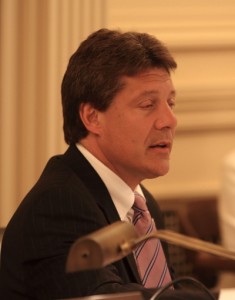Symbolism Displaced Substance at Trenton Gulf Oil Blowout Hearing
Jim Benton, standing in rear, head of NJ Petroleum Council, listens closely to DEP Commissioner Bob Martin speak on Gulf oil spill. Benton ruled the hearing (and will someone tell Martin that bottled water is extremely poor form).
This Was Not Kabuki – It was classic Dog & Pony
[Update #2 : 7/31/10 – news to me: according to today’s Atlantic City Press story about a meeting between DEP and LBI mayors:
The presentation also included an overview of the state’s inventory of oil spill containment boom and its effectiveness. We learned that the state has experience in this area and is basing its current efforts on responses to previous oil spills that occurred in the Delaware River and other areas off our coast.
Update #1: June 15, 2010: today’s Washington Post story puts the focus where it belongs – corporate greed and regulatory failure. It is obvious that BP cut corners and took huge risks to maximize production and profits. BP chose to trade-off safety and environmental risks to reduce costs. Regulators were “captured” and looked the other way. NJ – home of a huge petro-chemical complex – is highly vulnerable to the same problems and risks, which are greatly exacerbated by Christie environmental policy.
Wake up call to lame NJ legislators: THIS is oversight! Read the WaPo story: Lawmakers accuse BP of ‘shortcuts’
To save time and drilling costs, BP took “shortcuts” that may have led to the oil rig explosion and the spill in the Gulf of Mexico, according to a letter released Monday by two House Democrats leading an investigation of the disaster.
The letter, sent in advance of congressional hearings with senior oil executives this week, paints a damning picture of five decisions the lawmakers said the oil firm took “to speed finishing the well,” which was running “significantly behind schedule.” Marshaling e-mails, interviews and documents, the lawmakers said: “In effect, it appears that BP repeatedly chose risky procedures in order to reduce costs and save time, and made minimal efforts to contain the added risk.” – end update
Back in the day, a January 1969 oil well blowout off the California Coast near Santa Barbara focused the attention of the nation.
For comparison to the current BP Gulf blowout, the Santa Barbara blowout lasted 10 days and involved about 80,000 – 100,000 barrels of oil. The press reported that:
It was an environmental disaster that President Richard Nixon said “touched the conscience of the American people” as he called for a better way to use resources while protecting our natural surroundings.
Santa Barbara was followed 6 months later in June by the Cuyahoga River fire in Cleveland Ohio.
Both events galvanized an exploding environmental movement and led to a moratorium on off shore drilling and to the passage of powerful anti-pollution laws, like the 1972 Clean Water Act.
Environmental activists knew how to translate disaster into reform.
Given that context, could you even imagine – DURING THE ONGOING EVENT – the head of the California or Ohio EPA being allowed to provide un-challenged testimony at a Legislative hearing that focused exclusively on computer models and colorful maps of where the spill was likely to go? (one ditzy legislator said the map looked like a Monet painting!)
And imagine all this happening at a time when the California or Ohio Governor and Agency head were publicly calling for reduced industry oversight, rolling back envrionmental regulations, treating industrial polluters like “customers”, and slashing agency budgets?
Well that’s just what DEP Commissioner Bob Martin was allowed to do today– not only was he not grilled, he was thanked numerous times by legislators for his leadership!
Ah, don’t be naive – those are just corrupt politicians, you cynically reply.
But could anyone possibly imagine – in 1969 or now – numerous environmental lobbyists in suits, passively sitting by watching it all happen as they casually chatted with each other and fellow industry lobbyists?
Well, that happened today too – and it was painfully obvious by the “oversight” softball questions from Legislators on the Committee that the environmentalists had not even bothered to lobby – either that or Legislators had totally disregarded their concerns (if they even had any).
Pick you poison: lazy or ineffective.
You’ve come a long way Baby! Welcome to Chris Christie’s NJ!
In case anyone would like to examine DEP’s actual oil and chemical spill prevention and emergency response programs, see:
Prevention and Planning ( TCPA and DPCC programs)
Coastal Management (and coastal vulnerability assessment)
Maybe Commissioner Martin will do more than just issue press releases and computer model the highly unlikely impacts of the Gulf oil on NJ’s shore.
Like maybe he might do some actual field tests of DEP’s emergency response plans and assure that they are fully resourced. Perhaps he might be asked to assure that prevention/TCPA & DPCC regulations are strictly enforced (or compare those plans and capabilities to the highly deficient BP and Coast Guard plans in the Gulf, so that lessons can be learned).
Or maybe someone will ask him questions about how DEP budget cuts, staff reductions, and lack of equipment have eroded capacity to prevent and respond to a spill – and off course, Martin needs to explain how expediting approvals and treating the petro-chemical industry as a “customer” – while rolling back oversight and weakening NJ State regulations will impact these DEP programs.

Assembly Environment Committee Chairman, John McKeon (D-Essex)
Not to worry, Chairman McKeon is “deepy concerned” and right on top of it (at least according to the press):
“If the oil spill were to reach the Jersey shoreline, it would put our state and coastal economy in peril,” McKeon said. “We are deeply concerned about such a possibility, however remote. Today, we will examine closely our state’s preparedness should the oil spill reach our coastline.”
If what I heard today was “close examination”, I got some landfills in the Meadowlands for you.
(oh, I forgot to mention that Senate bill (S466), a bill that provides subsidies to OIL HEATING, was released from Committee today too! – No Joke.)
[Update: Martin needs to make up his mind. First he issues a high profile over the top press release touting his “Gulf Spill Response Team” and then today emphasized the importance of NJ’s $40 billion/year tourism and fishing/seafood industry. But then scientists say there is virtually no risk to the NJ coast and DEP says they are spending no money and doing very little:
From the get go, I have said Martin has exaggerated the threat and badly mismanaged the situation. His over the top press remarks may have had a negative impact on shore tourism and seafood industry. Martin postures and creates a false appearance of leadership, while masking erosion of DEP capabilities and the impacts of his won policies. Triple negative:
